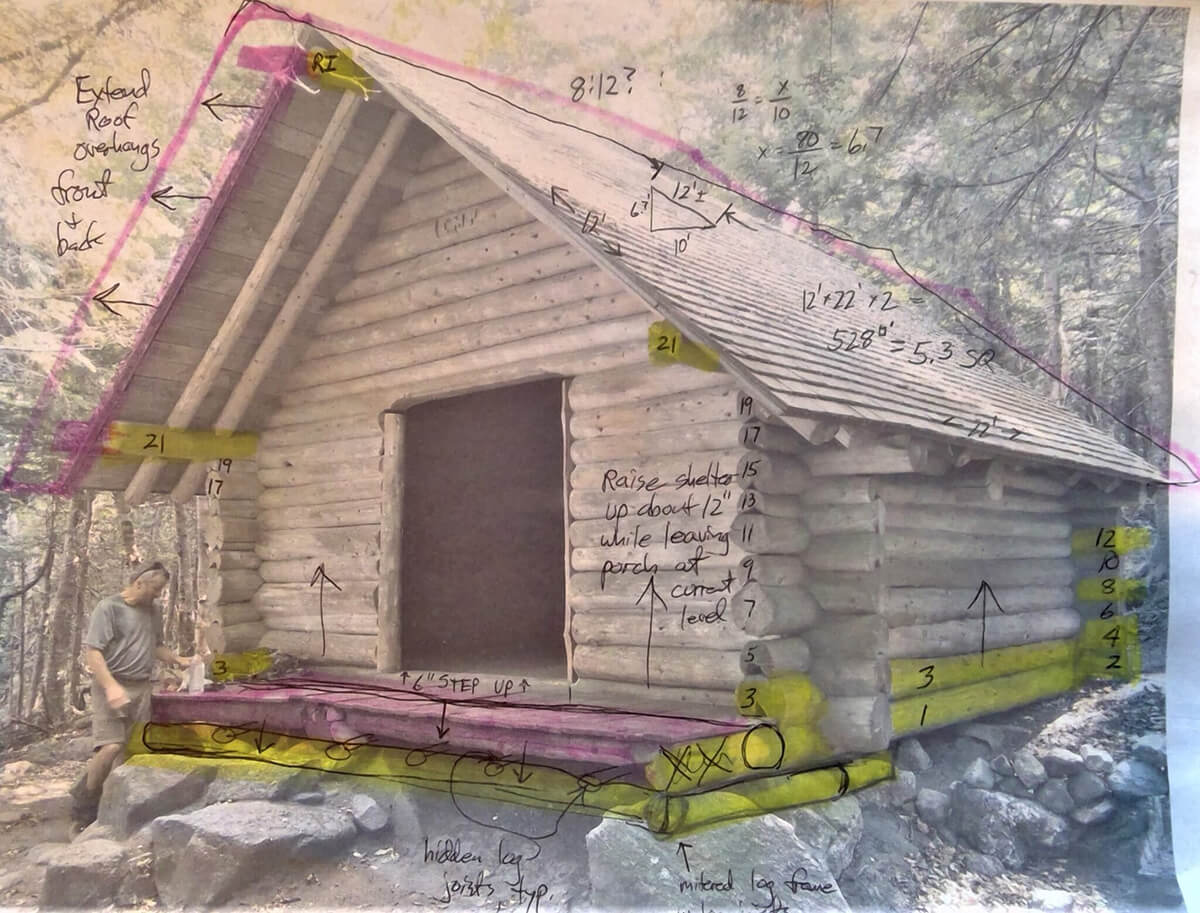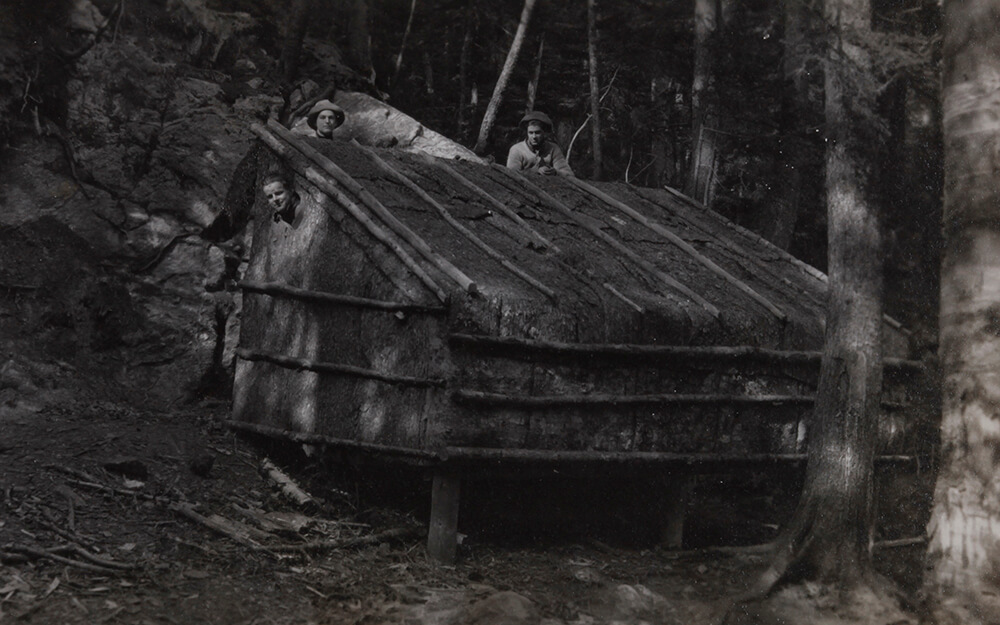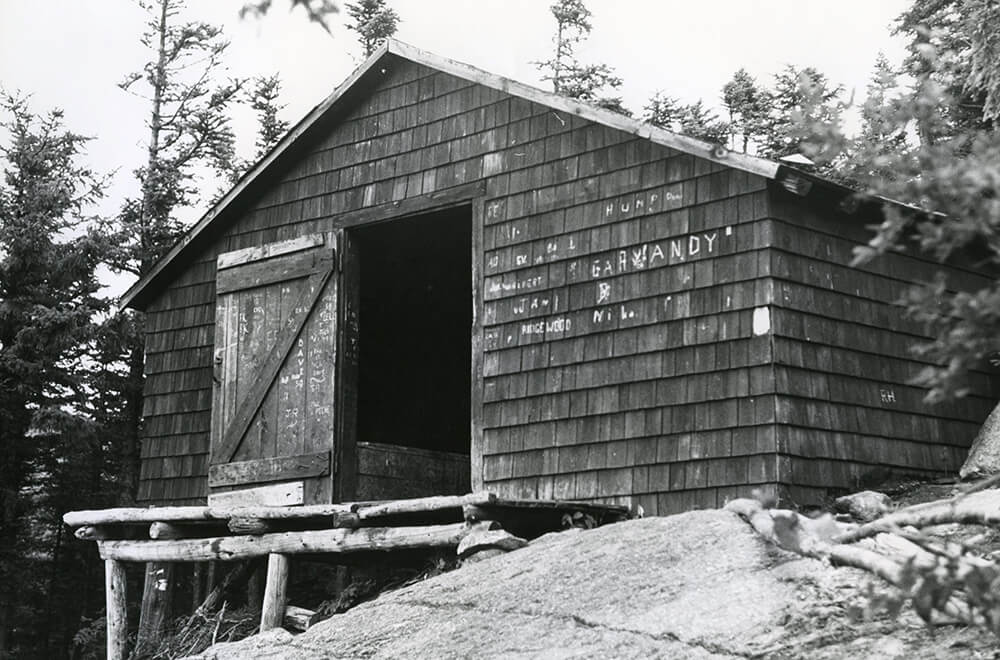

Plans to renovate Imp Shelter in the White Mountain National Forest include raising the structure, extending the front vestibule, and reusing many of the original 1980 timber.
Update: Imp Shelter renovations were completed in October 2021. The entire shelter was disassembled to replace the rotting floor and sills, plus a new roof was installed. It is now open and welcoming visitors and thru-hikers.
By this fall, Appalachian Trail (A.T.) thru-hikers will have a more reliable overnight option between North Carter Mountain and Mount Moriah in the White Mountain National Forest.
This field season AMC’s Campsite Program will begin restoration of Imp Shelter, which was last rebuilt in 1980 and was the last native timber shelter built in the White Mountains. This project will give new life to an aging structure while keeping its unique, native aesthetic. Each log, cut on-site in 1980, will be removed, labeled, and set aside. New sills, floor joists, and decking will be flown up to Imp Campsite—located off Carter-Moriah Trail on the A.T.—via helicopter and installed in the same footprint that the shelter currently sits. The structure will be much higher off the ground to promote airflow and prolong the life of the logs. The original timber walls and rafters will then be reused and replaced as their structural integrity will not be compromised. The shelter will also receive new roof shingles adding at least another few decades to its overall life expectancy.
This method of shelter rehabilitation fits in line with the Campsite Program’s mission. It will cut down on helicopter flight time significantly as the numbers of loads flying to and from the site will be a fraction of what they would be were we to completely replace the shelter. The impacts of using a helicopter to transport materials in the backcountry is always a trade-off.
This project balances nostalgia and practicality. While the process of disassembling the shelter—while trying not cause any damage to the native timbers—will be tedious and time-consuming, we are excited to hold on to what can be salvaged, an homage to the shelters of yesteryear that are all but lost in today’s forests. With its focus on sustainability, the Imp project mirrors many of the other AMC initiatives throughout New England. The project prioritizes what is best for the visitor and the forest—not just what is cheapest or quickest.


Imp Shelter in 1907.
Imp Shelter has seen several iterations through the years, including a modest lean-to in the early 20th century and a sturdier wooden structure decades later. When the existing log cabin shelter first went up in 1980, there was an ease of constructing backcountry shelters that is all but long forgotten. Cutting down native timber on-site to build a shelter rarely occurs in today’s world of U.S. Forest Service management. Many of these aging shelters are built too low to the ground, causing logs to rot. In today’s current backcountry construction climate, it can be more cost effective to replace a shelter in its entirety than to only replace the compromised lower logs.
Last year, in 2020, AMC celebrated 50 years of AMC Backcountry Caretakers, a time period in which the program has evolved and grown with the skyrocketing use of New Hampshire trails. Paid caretakers live on-site from May to October managing droves of campers all looking to call the mountains home for a time. From the program’s birth, the caretaker’s duties are split between education, trail maintenance, and human waste management. One of the most heavily visited sections of the entire A.T., the White Mountains rely on these caretakers to consolidate the impacts of its many visitors and work to preserve the mountain experience. Each site has durable camping services, food storage, a dish wash station, water sources, and of course, the backbone of the program, compostable privies. The caretaker is an integral part of the composting system, which requires daily maintenance. Our “beyond the bin” composting process is exceptionally efficient in composting enormous amounts of human waste in a damp climate (such as the White Mountains) in a relatively short amount of time. However, this process is expensive and labor intensive. Anywhere from 30 to 60 50-pound bags of hardwood bark mulch is flown by helicopter to all 14 AMC-managed backcountry campsites at the beginning of the season, a crucial ingredient in the composting process. As expenses and helicopter costs continue to rise, the campsite program is raising its nightly fee to $15 a night per person. Even with that, the program will continue to operate at a deficit, with funding coming from grants and other internal AMC sources.


Imp Shelter in 1965.
Where we go from here is uncertain. With visitor use continuing to rise throughout the White Mountains, the backcountry campsites are at the front lines of this surge. It is now more important than ever to practice ethical camping practices and try to leave as little of an impact as possible in the mountains. We expect to complete the Imp Shelter renovation by October 15 and open its doors for another 40 years of rustic backcountry use.